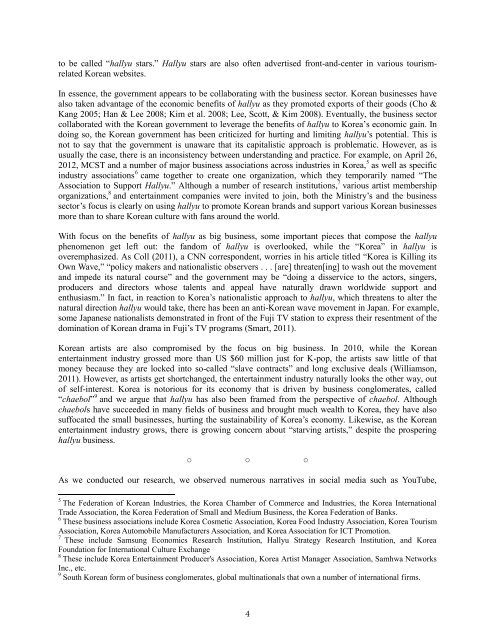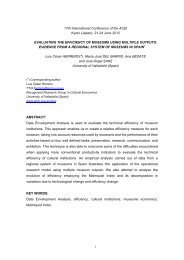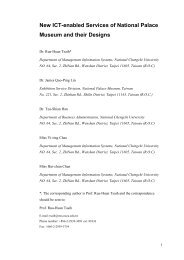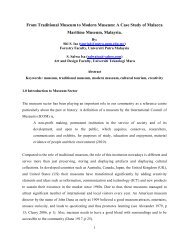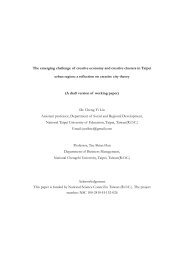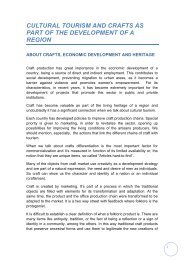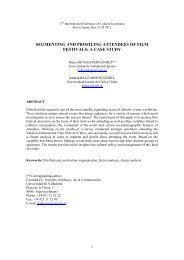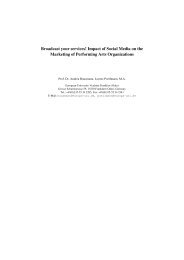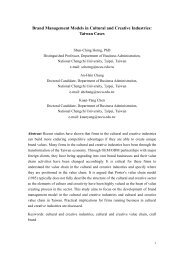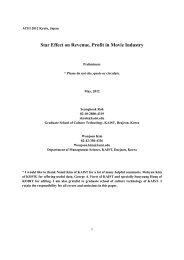The Korean Wave: Cultivating a Global Fandom by Shin-Eui Park ...
The Korean Wave: Cultivating a Global Fandom by Shin-Eui Park ...
The Korean Wave: Cultivating a Global Fandom by Shin-Eui Park ...
Create successful ePaper yourself
Turn your PDF publications into a flip-book with our unique Google optimized e-Paper software.
to be called “hallyu stars.” Hallyu stars are also often advertised front-and-center in various tourismrelated<br />
<strong>Korean</strong> websites.<br />
In essence, the government appears to be collaborating with the business sector. <strong>Korean</strong> businesses have<br />
also taken advantage of the economic benefits of hallyu as they promoted exports of their goods (Cho &<br />
Kang 2005; Han & Lee 2008; Kim et al. 2008; Lee, Scott, & Kim 2008). Eventually, the business sector<br />
collaborated with the <strong>Korean</strong> government to leverage the benefits of hallyu to Korea’s economic gain. In<br />
doing so, the <strong>Korean</strong> government has been criticized for hurting and limiting hallyu’s potential. This is<br />
not to say that the government is unaware that its capitalistic approach is problematic. However, as is<br />
usually the case, there is an inconsistency between understanding and practice. For example, on April 26,<br />
2012, MCST and a number of major business associations across industries in Korea, 5 as well as specific<br />
industry associations 6 came together to create one organization, which they temporarily named “<strong>The</strong><br />
Association to Support Hallyu.” Although a number of research institutions, 7 various artist membership<br />
organizations, 8 and entertainment companies were invited to join, both the Ministry’s and the business<br />
sector’s focus is clearly on using hallyu to promote <strong>Korean</strong> brands and support various <strong>Korean</strong> businesses<br />
more than to share <strong>Korean</strong> culture with fans around the world.<br />
With focus on the benefits of hallyu as big business, some important pieces that compose the hallyu<br />
phenomenon get left out: the fandom of hallyu is overlooked, while the “Korea” in hallyu is<br />
overemphasized. As Coll (2011), a CNN correspondent, worries in his article titled “Korea is Killing its<br />
Own <strong>Wave</strong>,” “policy makers and nationalistic observers . . . [are] threaten[ing] to wash out the movement<br />
and impede its natural course” and the government may be “doing a disservice to the actors, singers,<br />
producers and directors whose talents and appeal have naturally drawn worldwide support and<br />
enthusiasm.” In fact, in reaction to Korea’s nationalistic approach to hallyu, which threatens to alter the<br />
natural direction hallyu would take, there has been an anti-<strong>Korean</strong> wave movement in Japan. For example,<br />
some Japanese nationalists demonstrated in front of the Fuji TV station to express their resentment of the<br />
domination of <strong>Korean</strong> drama in Fuji’s TV programs (Smart, 2011).<br />
<strong>Korean</strong> artists are also compromised <strong>by</strong> the focus on big business. In 2010, while the <strong>Korean</strong><br />
entertainment industry grossed more than US $60 million just for K-pop, the artists saw little of that<br />
money because they are locked into so-called “slave contracts” and long exclusive deals (Williamson,<br />
2011). However, as artists get shortchanged, the entertainment industry naturally looks the other way, out<br />
of self-interest. Korea is notorious for its economy that is driven <strong>by</strong> business conglomerates, called<br />
“chaebol” 9 and we argue that hallyu has also been framed from the perspective of chaebol. Although<br />
chaebols have succeeded in many fields of business and brought much wealth to Korea, they have also<br />
suffocated the small businesses, hurting the sustainability of Korea’s economy. Likewise, as the <strong>Korean</strong><br />
entertainment industry grows, there is growing concern about “starving artists,” despite the prospering<br />
hallyu business.<br />
○ ○ ○<br />
As we conducted our research, we observed numerous narratives in social media such as YouTube,<br />
5 <strong>The</strong> Federation of <strong>Korean</strong> Industries, the Korea Chamber of Commerce and Industries, the Korea International<br />
Trade Association, the Korea Federation of Small and Medium Business, the Korea Federation of Banks.<br />
6 <strong>The</strong>se business associations include Korea Cosmetic Association, Korea Food Industry Association, Korea Tourism<br />
Association, Korea Automobile Manufacturers Association, and Korea Association for ICT Promotion.<br />
7 <strong>The</strong>se include Samsung Economics Research Institution, Hallyu Strategy Research Institution, and Korea<br />
Foundation for International Culture Exchange<br />
8 <strong>The</strong>se include Korea Entertainment Producer's Association, Korea Artist Manager Association, Samhwa Networks<br />
Inc., etc.<br />
9 South <strong>Korean</strong> form of business conglomerates, global multinationals that own a number of international firms.<br />
4


